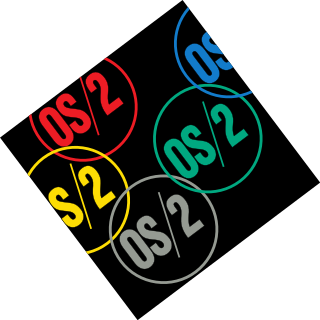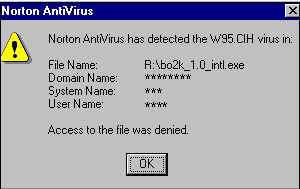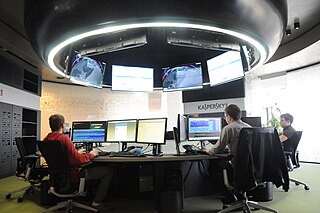Related Research Articles

In computing, BIOS is firmware used to provide runtime services for operating systems and programs and to perform hardware initialization during the booting process. The firmware comes pre-installed on the computer's motherboard.

mIRC is an Internet Relay Chat (IRC) client for Windows. It is a fully functional chat utility and its integrated scripting language makes it extensible and versatile. The software was first released in 1995 and has since been described as "one of the most popular IRC clients available for Windows." mIRC is shareware and requires payment for registration after the 30-day evaluation period.

OS/2 is a series of computer operating systems, initially created by Microsoft and IBM under the leadership of IBM software designer Ed Iacobucci. As a result of a feud between the two companies over how to position OS/2 relative to Microsoft's new Windows 3.1 operating environment, the two companies severed the relationship in 1992 and OS/2 development fell to IBM exclusively. The name stands for "Operating System/2", because it was introduced as part of the same generation change release as IBM's "Personal System/2 (PS/2)" line of second-generation personal computers. The first version of OS/2 was initially released in December 1987, and newer versions were released until December 2001.

FreeDOS is a free software operating system for IBM PC compatible computers. It intends to provide a complete MS-DOS-compatible environment for running legacy software and supporting embedded systems.

This timeline of computer viruses and worms presents a chronological timeline of noteworthy computer viruses, computer worms, Trojan horses, similar malware, related research and events.

The software release life cycle is the process of developing, testing, and distributing a software product. It typically consists of several stages, such as pre-alpha, alpha, beta, and release candidate, before the final version, or "gold", is released to the public.

Antivirus software, also known as anti-malware, is a computer program used to prevent, detect, and remove malware.

CIH, also known as Chernobyl or Spacefiller, is a Microsoft Windows 9x computer virus that first emerged in 1998. Its payload is highly destructive to vulnerable systems, overwriting critical information on infected system drives and, in some cases, destroying the system BIOS. The virus was created by Chen Ing-hau, a student at Tatung University in Taiwan. It was believed to have infected sixty million computers internationally, resulting in an estimated NT$1 billion (US$35,801,231.56) in commercial damages.

Mydoom was a computer worm that targeted computers running Microsoft Windows. It was first sighted on January 26, 2004. It became the fastest-spreading e-mail worm ever, exceeding previous records set by the Sobig worm and ILOVEYOU, a record which as of 2024 has yet to be surpassed.

Scareware is a form of malware which uses social engineering to cause shock, anxiety, or the perception of a threat in order to manipulate users into buying unwanted software. Scareware is part of a class of malicious software that includes rogue security software, ransomware and other scam software that tricks users into believing their computer is infected with a virus, then suggests that they download and pay for fake antivirus software to remove it. Usually the virus is fictional and the software is non-functional or malware itself. According to the Anti-Phishing Working Group, the number of scareware packages in circulation rose from 2,850 to 9,287 in the second half of 2008. In the first half of 2009, the APWG identified a 585% increase in scareware programs.

ESET NOD32 Antivirus, commonly known as NOD32, is an antivirus software package made by the Slovak company ESET. ESET NOD32 Antivirus is sold in two editions, Home Edition and Business Edition. The Business Edition packages add ESET Remote Administrator allowing for server deployment and management, mirroring of threat signature database updates and the ability to install on Microsoft Windows Server operating systems.
Norton AntiVirus is an anti-virus or anti-malware software product founded by Peter Norton, developed and distributed by Symantec since 1990 as part of its Norton family of computer security products. It uses signatures and heuristics to identify viruses. Other features included in it are e-mail spam filtering and phishing protection.

Sage 300 is the name for the mid-market line of enterprise management and accounting applications, primarily serving small and medium-sized businesses. Since 2004, Sage 300 is developed by Sage. In 2012, Sage renamed ACCPAC to Sage 300.

Norton Utilities is a utility software suite designed to help analyze, configure, optimize and maintain a computer. The latest version of the original series of Norton Utilities is Norton Utilities 16 for Windows XP/Vista/7/8, released 26 October 2012.
Faronics Corporation is a privately held software company with offices in Vancouver, British Columbia, Canada, Pleasanton, California, United States, Singapore and Bracknell, UK. Faronics develops computer software for multi-user IT environments.

McAfee VirusScan is an antivirus software created and maintained by McAfee. Originally marketed as a standalone product, it has been bundled with McAfee LiveSafe, McAfee AntiVirus Plus, McAfee Total Protection and McAfee Gamer Security since 2010. McAfee LiveSafe is antivirus protection that defends against viruses, online threats, and ransomware with online and offline protection integrates antivirus, firewall and anti-spyware/anti-ransomware capabilities.
In 2006, British telecom company BSkyB started offering Sky Broadband customers a branded version of VirusScan for free upon broadband modem installation.

Kaspersky Anti-Virus is a proprietary antivirus program developed by Kaspersky Lab. It is designed to protect users from malware and is primarily designed for computers running Microsoft Windows and macOS, although a version for Linux is available for business consumers.

A computer virus is a type of malware that, when executed, replicates itself by modifying other computer programs and inserting its own code into those programs. If this replication succeeds, the affected areas are then said to be "infected" with a computer virus, a metaphor derived from biological viruses.

Kaspersky Lab is a Russian multinational cybersecurity and anti-virus provider headquartered in Moscow, Russia, and operated by a holding company in the United Kingdom. It was founded in 1997 by Eugene Kaspersky, Natalya Kaspersky and Alexey De-Monderik. Kaspersky Lab develops and sells antivirus, internet security, password management, endpoint security, and other cybersecurity products and services.
Norton, formerly known as Norton by Symantec, is a brand of Gen Digital co-headquartered in Tempe, Arizona and Prague, Czech Republic. Norton originally provided utility software for DOS, and currently offers a variety of products and services related to digital security, identity protection, and online privacy and utilities.
References
- ↑ Miller, Greg (1996-02-20). "TECHNOLOGY : 'Boza' Infection of Windows 95 a Boon for Makers of Antivirus Software". latimes.com. Los Angeles Times. Retrieved 2024-06-17.
- ↑ Arthur, Charles (1996-02-04). "First virus infects Windows 95". independent.co.uk. The Independent. Retrieved 2024-06-17.
- ↑ "Computer Virus Hits Windows 95 But Boza Is Not Particularly Contagious". spokesman.com. The Spokesman-Review. 1996-02-05. Retrieved 2024-06-17.
- ↑ "Most Destructive Computer Viruses of All Time". cikd.ca. Canadian Institute for Knowledge Development. 2019-12-17. Retrieved 2024-06-17.
- ↑ Rodríguez, Ricardo (2023-07-12). "A Brief History of Malware (Part 3)". reversea.me. RME-DisCo Research Group. Retrieved 2024-06-17.